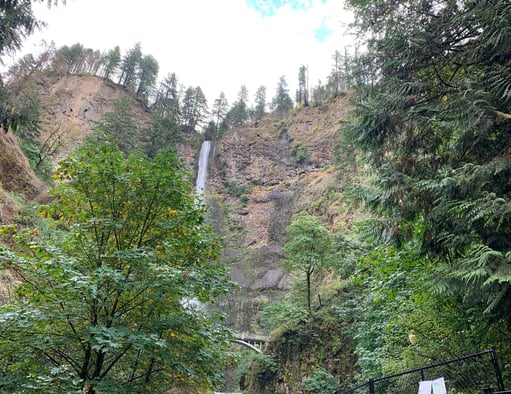Stressful Momements


Ever have one of those moments where you knew you could die? My most memorable happened on a mountain side above Multnomah Falls in the Columbia River Gorge in October of 1991. I was on a wildland fire with a US Forest Service fire crew doing initial attack all night. When the morning came the winds in the gorge picked up and we had a blowout, which was heading straight for us. I wound up running through the flames to get to the black (already burnt area). Unfortunately, we were cut off from our escape route and the crowns in the trees above us were still intact. (If you look at the photo, I was standing just to the right of the upper falls and couldn't even deploy my fire shelter.) They told me later, that they lost 20 acres in about 5 minutes. If the fire had gone a little more lateral instead of vertical I know I wouldn't be writing this blog post today. It took me 23 years to hike up to the top of the mountain again even though I had been to the base of the falls many other times.
The other day I was talking with a firefighter about PTSD and he was telling me that you can only get it from a traumatic experience (like mine on the hillside). In fact, he was very skeptical about anyone who claimed PTSD who didn't have a single traumatic incident to point to. While it's true that PTSD can be triggered by a single event, researchers and therapist today are beginning to realize that PTSD (or the better term I like, Post Traumatic Stress Injury) can come from experiencing many lower level stressful events, such as those that our firefighters, EMT's, police officers and 911 telecommunicators experience on a daily basis. These traumatic stressors can damage our souls and wound the very core of who we are.
There is a spiritual price to pay for the work we do. (I'm not talking religious, but religious may be part of it). There is a wound that happens every time we go on one of these calls. Most of the time we can shrug it off and go about our day, or at least relegate it to the realm of gallows humor. We first responders are very good at compartmentalizing this stress otherwise we wouldn't last long in this job. But a lot of times these wounds take shots at the foundations of our life and how we look at the world. Some of these wounds can be:
Every time we ask "Why did this happen?" and get no answer
When one of our friends gets hurt and we ask "how come them?" and "Why not me?"
When we hear the screams of the injured or dying and all we can do is watch
When we see the anguish from little kids or the disadvantaged and we have no words of comfort
When we come out of a dangerous situation and ask "Why didn't I die?"
When we see a wrong and don't see justice being done.
It wounds our spirit, that part of us that helps us make sense of the world and brings life to our soul. And it also takes a little of the joy we find in our jobs. That joy that keeps us coming back day to day for a job that has little or no pay.
We are beginning to change the culture in public safety but there still is a misunderstanding of the damage of that this job can do to a person. And with all respect to the "Suck it up buttercup" generation, your understanding of first responder mental health and the up and coming generations are getting people killed. People who don't feel supported tend to be more likely to leave your department, have higher divorce rate, higher substance abuse and even a higher suicide rate. And if you don't think that's an issue realize that there are more firefighter suicides each year than there are line of duty deaths.
So, what's the answer? First, take enough time to care. I know that's a jab, but that is where it really starts. Take time to really care about those who work around you. Then, second, get educated. You spend time learning your craft so you can do it well. Make this part of your training. Figure that this is just another part of "Rescuing the Rescuer". You may not pull your fellow firefighter out of a burning building during your career, but you may help save their life by helping pull them from the edge of suicide. And third, act. Isn't that what we do as first responders? We see an event where somebody is in danger and we go into rescue mode. Let this be no different. Get out there, push through what may be uncomfortable and help save a life…the life of your brothers and sisters.
